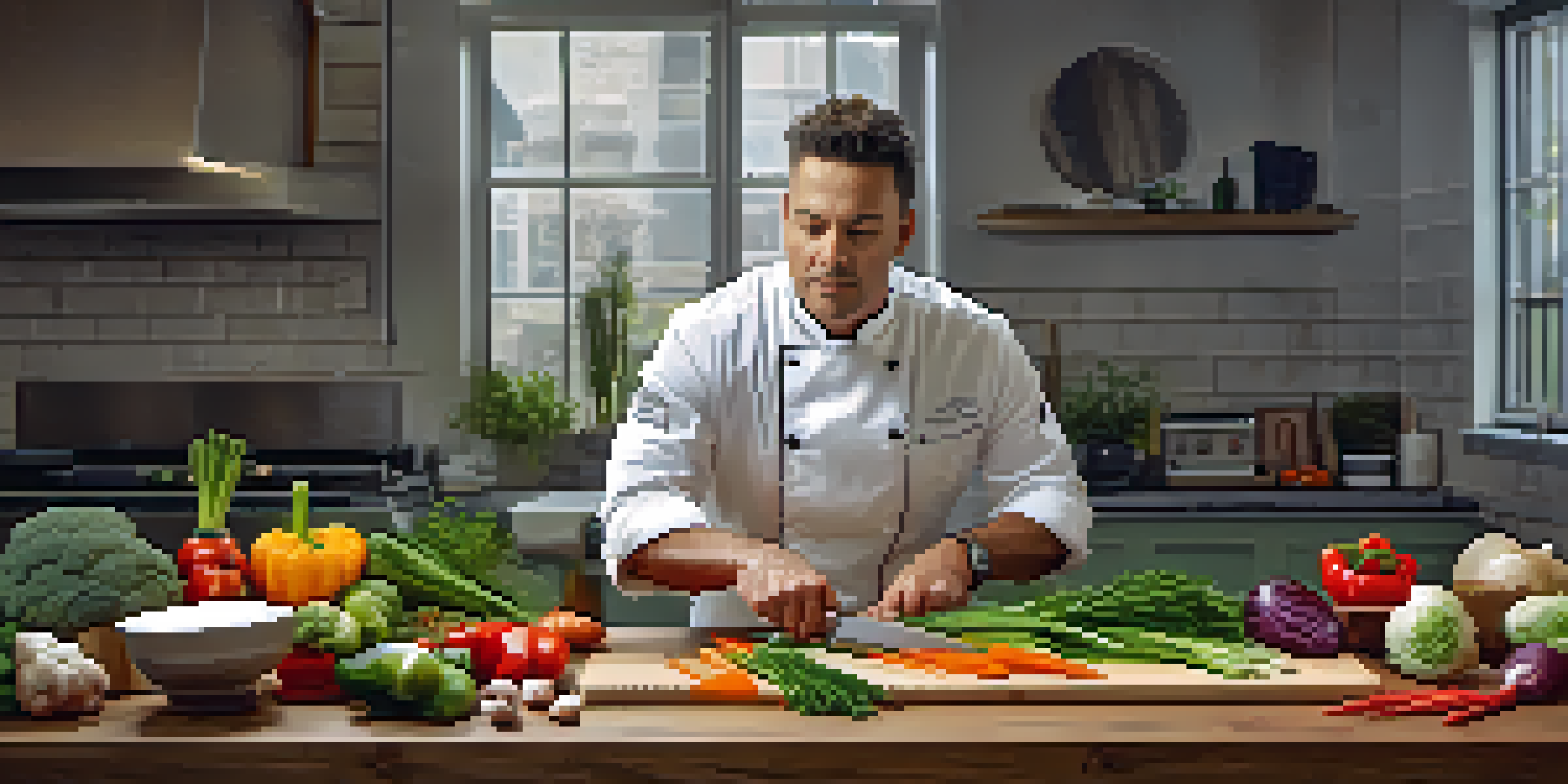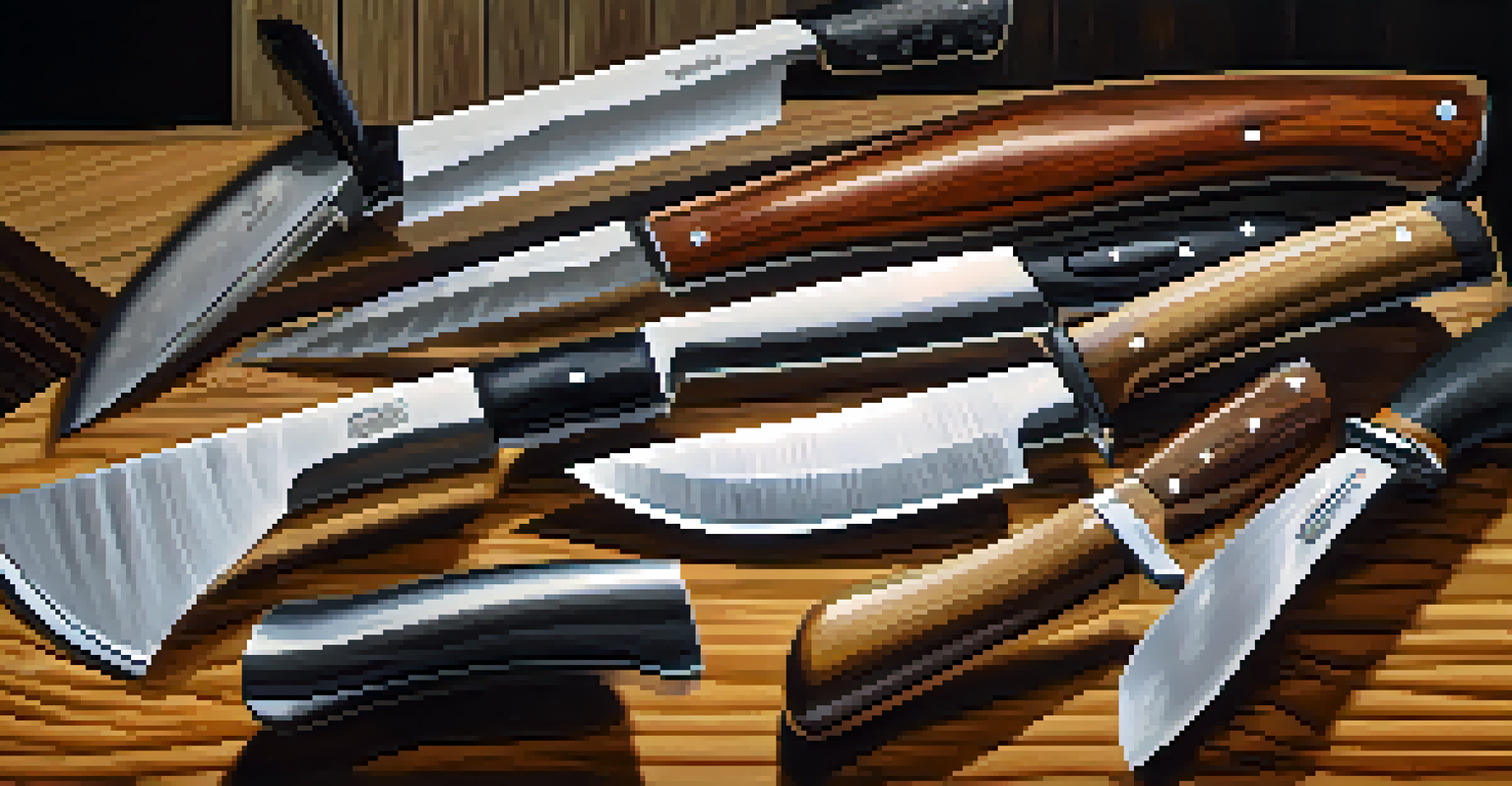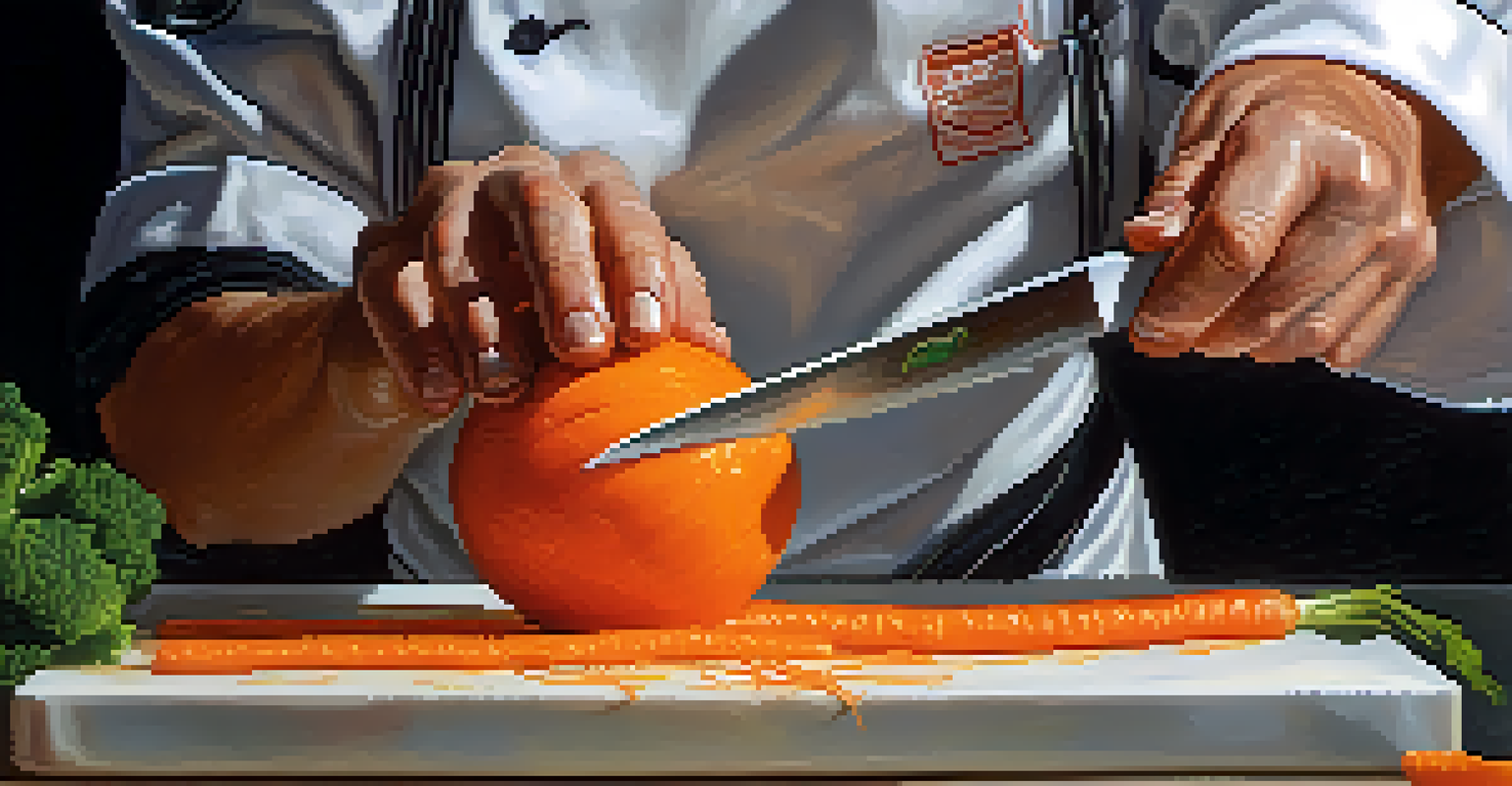Advanced Knife Skills: Techniques for Professional Chefs

Understanding the Importance of Knife Skills in Cooking
Knife skills are the backbone of culinary excellence. For professional chefs, the ability to wield a knife with precision can drastically improve the quality and presentation of dishes. Mastering these skills not only enhances efficiency in the kitchen but also ensures safety while preparing food.
A chef is only as good as his knife.
When chefs possess advanced knife skills, they can execute tasks quickly and with confidence. This expertise allows them to tackle various ingredients, from delicate herbs to sturdy vegetables, with ease. Ultimately, good knife skills lead to a more enjoyable cooking experience, both for the chef and the diners.
Moreover, understanding the various knife techniques can elevate a chef's creativity. With the right skills, a chef can explore intricate cuts and presentations that transform simple ingredients into culinary masterpieces. In essence, knife skills are not just about cutting; they're about artistry in the kitchen.
Essential Knife Types and Their Uses for Chefs
Different knives serve different purposes in the kitchen, and knowing which one to use is crucial. The chef's knife is the workhorse, perfect for chopping, slicing, and dicing. Meanwhile, a paring knife excels at intricate tasks, like peeling or trimming fruits and vegetables.

Specialty knives, such as the boning knife and serrated knife, also play significant roles in advanced knife skills. A boning knife allows chefs to separate meat from bones effortlessly, while a serrated knife is ideal for slicing bread or delicate items without crushing them. Understanding these tools is key to maximizing efficiency and achieving desired results.
Knife Skills Enhance Culinary Artistry
Mastering knife skills not only improves efficiency in the kitchen but also allows chefs to express creativity through intricate cuts and presentations.
By becoming familiar with the various knives, chefs can choose the right tool for each task. This not only improves their speed but also enhances the quality of their cuts. In a bustling kitchen, having the right knife at hand is equivalent to having the right brush for a painter.
Mastering Basic Cuts: The Foundation for Advanced Skills
Before diving into advanced techniques, mastering basic knife cuts is essential. Familiar cuts include the julienne, brunoise, and chiffonade, each serving as a building block for more intricate techniques. These foundational skills not only improve precision but also ensure consistency in cooking.
The knife is a chef’s most important tool, not just for cutting but for creating art in the kitchen.
For instance, a julienne cut results in thin, matchstick-like pieces, which are perfect for stir-fries or salads. In contrast, a brunoise cut creates tiny cubes that can enhance the texture and presentation of dishes. By practicing these basic cuts, chefs build muscle memory that allows them to work efficiently under pressure.
Additionally, mastering basic cuts lays the groundwork for creativity. Once chefs are comfortable with these techniques, they can experiment with their own styles and presentations. This confidence fosters innovation in the kitchen, leading to unique and memorable culinary creations.
Advanced Techniques: Creating Unique Cuts and Presentations
Once the basics are mastered, chefs can explore advanced techniques like the tourne and concasse. The tourne cut, which shapes vegetables into a football-like form, not only enhances visual appeal but also promotes even cooking. On the other hand, concasse is a technique used for peeling and chopping tomatoes, which is vital for sauces and garnishes.
These advanced cuts require practice and precision but can elevate a dish from ordinary to extraordinary. Chefs often incorporate these techniques to impress diners with their skill and attention to detail. The artistry involved in these cuts can make a significant difference in the overall dining experience.
Safety is Key in Knife Usage
Proper knife techniques and maintenance significantly reduce the risk of accidents and cross-contamination, promoting a safer cooking environment.
Moreover, experimenting with unique cuts can inspire creativity in the kitchen. As chefs become more comfortable with advanced techniques, they can develop their own signature styles. This personal touch can set them apart in a competitive culinary landscape.
Knife Skills and Food Safety: A Critical Connection
Knife skills are not just about aesthetics; they play a crucial role in food safety. Proper cutting techniques can minimize the risk of accidents, ensuring that chefs can work efficiently without injury. A well-maintained knife also reduces the chances of cross-contamination, promoting a safer kitchen environment.
For instance, using a sharp knife allows for cleaner cuts, which can prevent foodborne illnesses that arise from improperly prepared ingredients. Additionally, understanding how to handle knives safely, such as using the claw grip, helps protect fingers from accidental cuts. In a professional kitchen, safety should always be a top priority.
By instilling good knife habits, chefs create a culture of safety and responsibility in the kitchen. This not only protects the chefs themselves but also ensures that diners receive safe, high-quality dishes. Ultimately, mastering knife skills is about more than just technique; it's about fostering a safe and healthy culinary environment.
Maintaining Your Knives: A Key to Longevity and Performance
Maintaining knives is an essential part of being a professional chef. Regular sharpening and honing keep blades in top condition, ensuring that cuts are clean and precise. Dull knives can lead to accidents, as they require more force to cut through ingredients, increasing the risk of slips.
In addition to sharpening, proper storage is crucial. Knives should be stored in a way that protects their edges, such as in a knife block or on a magnetic strip. This not only prolongs the life of the knives but also keeps the kitchen organized and safe.
Proper Knife Care Prolongs Performance
Regular maintenance, including sharpening and proper storage, is essential for keeping knives in optimal condition, thus enhancing a chef's performance and control.
By taking the time to care for their knives, chefs can enhance their performance in the kitchen. A well-maintained knife becomes an extension of the chef's hand, allowing for greater control and creativity. Ultimately, investing in knife maintenance is an investment in culinary excellence.
The Impact of Knife Skills on Culinary Creativity and Efficiency
Advanced knife skills can significantly impact a chef's creativity and efficiency in the kitchen. With a strong foundation in cutting techniques, chefs can express their culinary vision more freely. This fluidity allows them to innovate and experiment with flavors, textures, and presentations.
Moreover, efficient knife skills streamline the cooking process. When chefs can chop, slice, and dice quickly, they can focus on other essential elements of cooking, such as flavor development and plating. This balance enhances the overall quality of the dish and the dining experience.

In conclusion, mastering advanced knife skills empowers chefs to elevate their craft. By blending creativity with efficiency, they can create memorable culinary experiences that leave a lasting impression on diners. The knife, in the hands of a skilled chef, becomes not just a tool but a means of artistic expression.